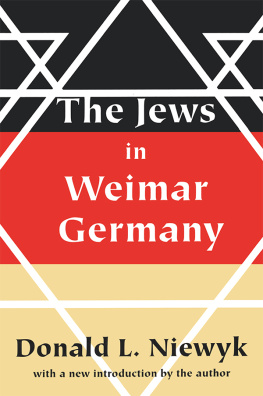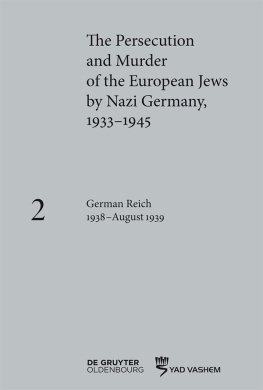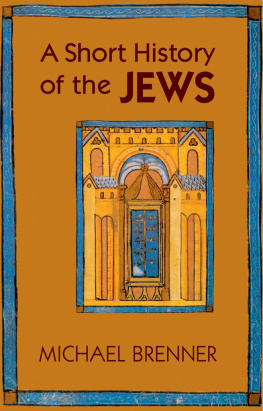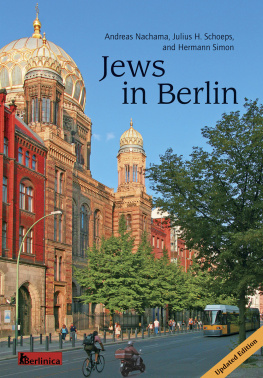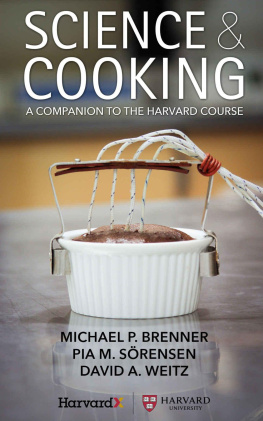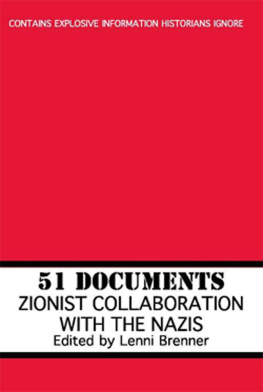Brenner Michael - A History of Jews in Germany Since 1945
Here you can read online Brenner Michael - A History of Jews in Germany Since 1945 full text of the book (entire story) in english for free. Download pdf and epub, get meaning, cover and reviews about this ebook. year: 2018, publisher: Indiana University Press, genre: Religion. Description of the work, (preface) as well as reviews are available. Best literature library LitArk.com created for fans of good reading and offers a wide selection of genres:
Romance novel
Science fiction
Adventure
Detective
Science
History
Home and family
Prose
Art
Politics
Computer
Non-fiction
Religion
Business
Children
Humor
Choose a favorite category and find really read worthwhile books. Enjoy immersion in the world of imagination, feel the emotions of the characters or learn something new for yourself, make an fascinating discovery.

- Book:A History of Jews in Germany Since 1945
- Author:
- Publisher:Indiana University Press
- Genre:
- Year:2018
- Rating:3 / 5
- Favourites:Add to favourites
- Your mark:
- 60
- 1
- 2
- 3
- 4
- 5
A History of Jews in Germany Since 1945: summary, description and annotation
We offer to read an annotation, description, summary or preface (depends on what the author of the book "A History of Jews in Germany Since 1945" wrote himself). If you haven't found the necessary information about the book — write in the comments, we will try to find it.
A History of Jews in Germany Since 1945 — read online for free the complete book (whole text) full work
Below is the text of the book, divided by pages. System saving the place of the last page read, allows you to conveniently read the book "A History of Jews in Germany Since 1945" online for free, without having to search again every time where you left off. Put a bookmark, and you can go to the page where you finished reading at any time.
Font size:
Interval:
Bookmark:
A HISTORY OF JEWS IN GERMANY SINCE 1945
POLITICS, CULTURE, AND SOCIETY
EDITED BY MICHAEL BRENNER
TRANSLATED BY KENNETH KRONENBERG

The translation of this work was funded by Geisteswissenschaften InternationalTranslation Funding for Humanities and Social Sciences from Germany, a joint initiative of the Fritz Thyssen Foundation, the German Federal Foreign Office, the collecting society VG WORT, and the Brsenverein des Deutschen Buchhandels (German Publishers & Booksellers Association). This book is a project of the Leo Baeck Institute for the History and Culture of German Jewry.
This book is a publication of
Indiana University Press
Office of Scholarly Publishing
Herman B Wells Library 350
1320 East 10th Street
Bloomington, Indiana 47405 USA
iupress.indiana.edu
Originally published as Geschichte der Juden in Deutschland von 1945 bis zur Gegenwart: Politik, Kultur und Gesellschaft
Verlag C. H. Beck oHG, Mnchen 2012
English translation 2018 by Indiana University Press
All rights reserved
No part of this book may be reproduced or utilized in any form or by any means, electronic or mechanical, including photocopying and recording, or by any information storage and retrieval system, without permission in writing from the publisher.
The paper used in this publication meets the minimum requirements of the American National Standard for Information SciencesPermanence of Paper for Printed Library Materials, ANSI Z39.481992.
Manufactured in the United States of America
Library of Congress Cataloging-in-Publication Data
Names: Brenner, Michael, author, editor.
Title: A history of Jews in Germany since 1945 : politics, culture, and society / edited by Michael Brenner ; translated by Kenneth Kronenberg.
Other titles: Geschichte der Juden in Deutschland von 1945 bis zur Gegenwart. English
Description: Bloomington : Indiana University Press, [2018] | Includes bibliographical references and index.
Identifiers: LCCN 2017037422 (print) | LCCN 2017038319 (ebook) | ISBN 9780253029294 (e-book) | ISBN 9780253025678 (cloth : alk. paper)
Subjects: LCSH: JewsGermanyHistory1945-1990. | JewsGermanyHistory1990- | JudaismGermanyHistory20th century. | JudaismGermanyHistory21st century.
Classification: LCC DS134.26 (ebook) | LCC DS134.26 .B73513 2012 (print) | DDC 305.892/4043dc23
LC record available at https://lccn.loc.gov/2017037422
1 2 3 4 5 23 22 21 20 19 18
Michael Brenner
Jews in Germany after the Holocaust: An Interpretation
Dan Diner
Atina Grossmann and Tamar Lewinsky
Michael Brenner and Norbert Frei
Constantin Goschler and Anthony Kauders
Yfaat Weiss and Lena Gorelik
Michael Brenner
A HISTORY OF JEWS IN GERMANY SINCE 1945
MICHAEL BRENNER
NO ONE WOULD have ventured to contradict Rabbi Leo Baeck when, after World War II, he stated that the age of German Jewry had come to a definitive end. Modern German-Jewish history, which began with the Enlightenment and continued to unfold through the Weimar Republic, could simply not continue seamlessly as if nothing had happened. As a result, after 1945 the leading figures in the Jewish community came to reject the notion of German citizens of Jewish faith, which was how German Jews had viewed themselves prior to 1933, and instead chose to call their organization the Central Council of Jews in Germany. This name signaled a break with the understanding that German Jews of previous generations had developed about their relationship to German society as a whole. It also acknowledged the fact that the majority of Jews now living in Germany came from Eastern Europe.
In the years immediately following the war, approximately 250,000 persons who had survived the Holocaust in Eastern Europe (the so-called displaced persons, or DPs) joined the 15,000 or so German-Jewish survivors and returnees from exile in camps mostly in the American sector in Germany. A distinctive topography developed in the Jewish community in Germany during the decades following the war. The German Jews began to coalesce around the Central Council and later the Allgemeine Jdische Wochenzeitung (Jewish weekly newspaper), headquartered in Dsseldorf, while Eastern European DPs tended to gather in Munich, where most of the American facilities were to be found. The actual center of Jewish life during those years, however, the vibrant center of intellectual and economic life, was located in Frankfurt am Main, the functional capital of the Federal Republic. Although Berlin had lost its position as the dominant metropolis in Jewish lifebefore 1933 fully a third of Jewish citizens had lived therethe western part of the city continued to harbor the largest postwar German-Jewish community. At the same time, East Berlin was home to the only Jewish community of any significant size in the German Democratic Republic. And although organized Jewish life remained fairly modest in East Germany, the number of well-known persons with a Jewish family background who were active in politics and culture was larger than in the Federal Republic.
As Dan Diner emphasizes in the introduction to this volume, Jewish life in Germany first existed in the shadow of a herem [ban]. In 1948 the World Jewish Congress proclaimed the determination of the Jewish people never again to settle on the bloodstained soil of Germany. For many years, even decades, Germany remained for Jews a proscribed country. Nonetheless, small Jewish communities began to sprout up in both partitioned German states. But even more important than their small size was their symbolic significance, as then military governor and later U.S. high commissioner John J. McCloy made clear: What this community will be, how it forms itself, how it becomes a part and how it merges with the new Germany, will, I believe be watched very closely and very carefully by the entire world. It will, in my judgement, be one of the real touchstones and the test of Germanys progress towards the light.
Several times during the early 1950s, representatives of Jewish organizations made headlines with their public protests. These ensued, for example, when Veit Harlan, the director of the notorious film Jud S (Jew Sss), was exonerated in 1950 of aiding and abetting the Nazis and after the suicide of Philipp Auerbach, who had been a dominant figure in Jewish life, after the announcement of a guilty verdict on charges of embezzlement and fraud. Subsequently, Jews in the Federal Republic retreated into the private sphere or, as Dan Diner formulates it in this volume, into an absent presence. The Central Council of Jews in Germany acted primarily behind the scenes, and as a result its leaders were virtually unknown to the public at large. For example, the councils general secretary, Hendrik George van Dam, who over a period of two decades played a crucial role in the political fortunes of Germanys Jews, used mainly back channels to advance the cause of financial compensation for the Jewish community so that it might flourish in the future.
The Jewish communities, which initially consisted of not more than twenty thousand members, lived in almost complete isolation from German society, which in any case showed little interest in what constituted Jewish life. Synagogues were often found in the courtyards of apartment buildings or in recently erected simple structures. Religious life was on a rather small scale; at times, fewer than a dozen rabbis ministered to the needs of the approximately eighty communities.
Next pageFont size:
Interval:
Bookmark:
Similar books «A History of Jews in Germany Since 1945»
Look at similar books to A History of Jews in Germany Since 1945. We have selected literature similar in name and meaning in the hope of providing readers with more options to find new, interesting, not yet read works.
Discussion, reviews of the book A History of Jews in Germany Since 1945 and just readers' own opinions. Leave your comments, write what you think about the work, its meaning or the main characters. Specify what exactly you liked and what you didn't like, and why you think so.

